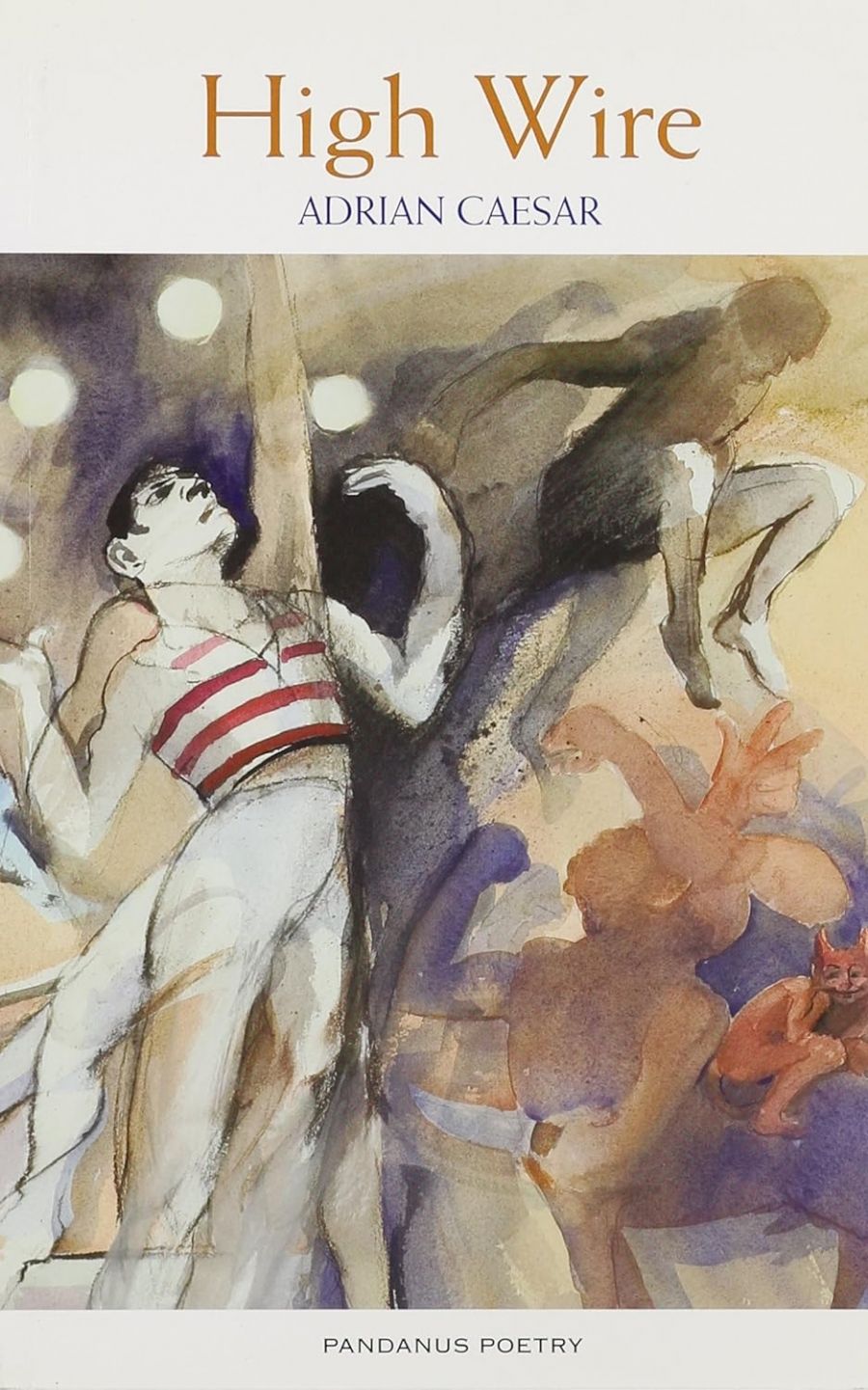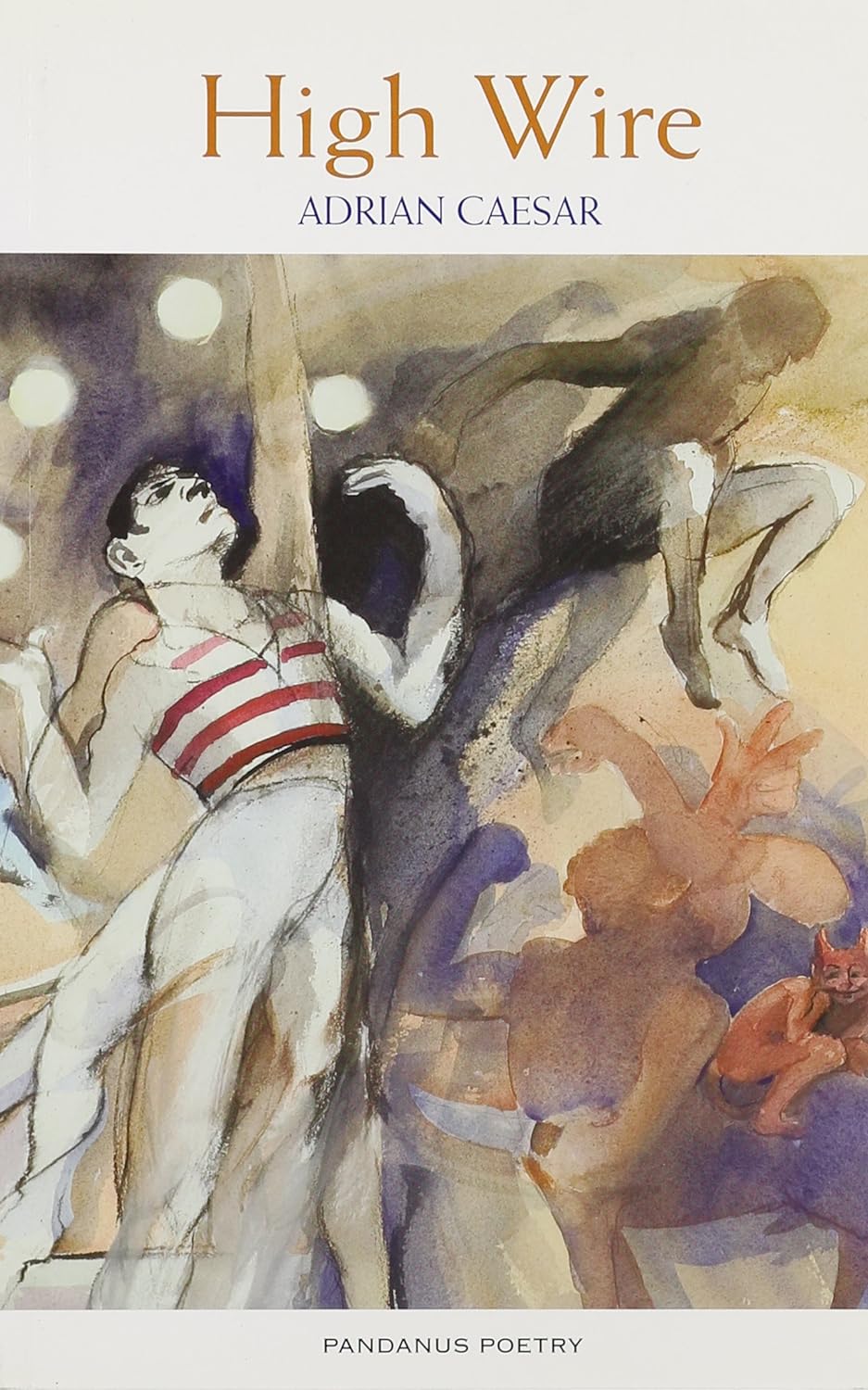
- Free Article: No
- Custom Article Title: Caesar of the Antarctic
- Review Article: Yes
- Article Title: Caesar of the Antarctic
- Online Only: No
- Custom Highlight Text:
Having taught literary studies at the Australian Defence Force Academy, Adrian Caesar is perhaps better placed than most to understand the troubled relationship between power and culture, order and creativity. ‘All Cock Red’, one of the poems in Caesar’s fourth book of poems, High Wire, attends to such a context:
- Book 1 Title: High Wire
- Book 1 Biblio: Pandanus, $19.80 pb, 102 pp
- Book 1 Cover Small (400 x 600):

- Book 1 Cover (800 x 1200):

On the day the twin towers fell
I was teaching Greek tragedy
to a bunch of military cadets,
women mostly, ‘Could you
explain Hubris,’ they said.
C’est bizarre n’est ce pas?
Earlier that day we’d heard a General
‘Ladies and Gentlemen today
our world changed forever
we are on security alert code
Weathercock Amber.’
(I bullshit you not.)
This is one of the more arresting moments in what is, for me, a disappointing book. The opening lines of ‘All Cock Red’, with their relaxed tone and nice interplay between the large and small, the personal and institutional, are appropriately edgy. But the poem, as with so many poems in this collection, doesn’t quite deliver. Instead, it lapses into indistinct assertions about the obscenity of killing innocents and ‘bombing / for democracy’. Like many of the other political or moral assertions of this assertive book, it’s not that what is being said is objectionable but that it does not add to a comparable assertion in prose.
This is partly because Caesar often uses empty epithets to characterise those whom he reproaches. The politicians who bomb ‘tens of thousands’ of innocents are ‘little men with big cigars’ (elsewhere they are ‘suits’). Such vagueness begins to look less like a satirical style and more like a lack of nerve when one compares Caesar’s political poems with those of Jennifer Maiden’s Friendly Fire (2005), in which she names names. In Friendly Fire, the poems do not simply decry the lies and massacres, they critique them with the full moral and rhetorical force that poetry can offer.
As well as politicians, Caesar has popular culture, cyberspace and the suburbs in his sights. In ‘Rules of Engagement’ (another satire on the so-called ‘war on terror’), he writes: ‘Let the home front suck the pap / of popular culture; / it encourages ignorance and indifference / to the other peoples of the world.’ In ‘In the Net’, cyberspace is characterised as a soulless refuge from reality, whose inhabitants ‘live without zing, zip, passion or romance’. In the suburban satire of ‘Neighbourhood Guide’ (one of a number of clunky dramatic monologues), the speaker says: ‘We don’t want to know / keep ourselves to ourselves.’
In each case, Caesar’s assertions are either banal, question-begging or both. Even if popular culture is an agent of intercultural ignorance, why is it necessarily ‘pap’? (And what is popular culture anyway? Britney Spears? Mike Moore? Jane Austen?) And why is cyberspace anything other than a metaphor for the information available through computer networks?
Such questions may be ungenerous, but they do suggest something of my frustration with this book as a collection of poems, rather than as a summation of opinions or values or beliefs. Ultimately, the extra-poetic baggage of High Wire paradoxically points to its post-Romantic condition. The reality presented in Caesar’s satirical and political poetry is at odds with the ideal, the explicitly post-Romantic theme of a number of poems in High Wire. For instance, the paradigmatically Romantic ‘Night Sailing’ images lost childhood so as to approach the theme of mortality. ‘In Dublin, 1999’ most keenly presents the contrast between romance and reality. Rather than Yeatsian romance, the tourist-poet finds in Ireland a landlady talking of real estate and ‘the latest single by The Corrs’.
If the real world is unpoetic, then poetry requires a language beyond the everyday. Caesar, however, does not rely on astonishing metaphor or artful syntax, but rather a tone of reverence for the poetic itself. Many of Caesar’s poems programmatically stage themselves as poems both thematically and stylistically. This staging, as well as the post-Romantic disaffection with the real, is perhaps the source of a lexical tension in the poems between the vernacular and the overwrought poeticism. Of the latter, there is ‘mouth’ used as a verb (three times), ‘rapt’ (which also appears three times), ‘latterly’, ‘revenant’, ‘sally’, ‘assays’ and ‘winsome’. Admittedly, a number of these appear in overtly ironic poems (the disaffected mode of the Romantic). Four poems, for instance, feature the comic figure of Pierrot as middle-aged, failed and crass. But here, too, the climax is little more than cliché. Pierrot is ‘an ageing clown playing it all for laughs, / who no longer recognises the face that hides / behind the painted, leering mask’.
The diversity of poems in High Wire shows a poet competent with the various forms expected of a contemporary poet: dramatic monologue; the Dinggedicht, or ‘thing poem’ (in this case, three good ones on vegetables); ekphrasis (poetry responding to visual art); satire; the sonnet; occasional verse. But Caesar is at his most original and compelling in the sequence ‘Black-Marks: An Antarctic Notebook’, in which the act of writing a poem is imagined in heroic terms (more staging). The move across the white page is presented as that of an explorer across the Antarctic ice. The fit between self-reflexivity and heroic theme means that Caesar’s hieratic style finds an appropriate home. Previous writer-explorers are presented as ‘athletes of splendid wishes’ who ‘spend midnight time / in dark self-persuasion’. The real Antarctic explorer Scott (about whom Caesar has written a prize-winning book) is also memorably figured: ‘sucking on opium he made love / to his diary the final devotion / to be sold to a waiting nation / fixing his legend in a fine syntax.’ What makes this sequence moving and impressive is its suggestion that poetry may already be a kind of failure. At this point, it seems to me, Caesar’s poetry becomes less assured and therefore more affecting and interesting. As the title of High Wire suggests, Caesar is well aware of the difficulties and dangers of writing poetry. While Caesar is not always sure-footed, ‘Black-Marks’ shows that he can traverse difficult territory.


Comments powered by CComment